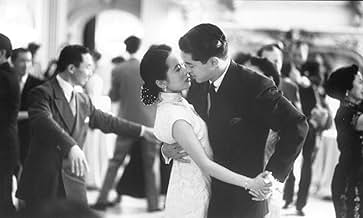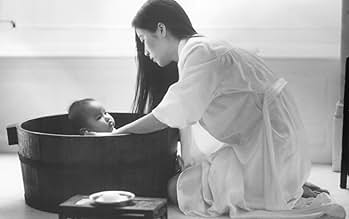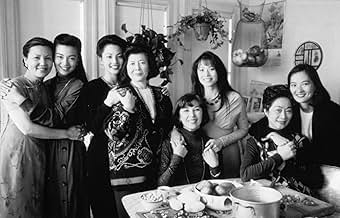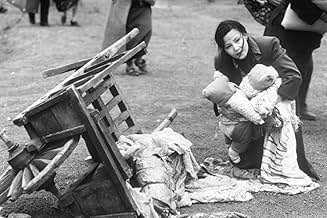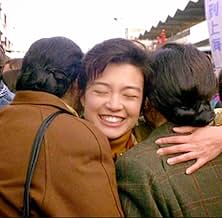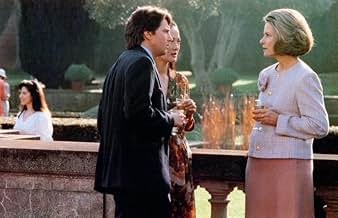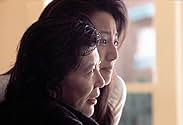VALUTAZIONE IMDb
7,7/10
19.262
LA TUA VALUTAZIONE
La vita di quattro donne asiatiche e delle loro figlie, guida e riferimento l'una per l'altra.La vita di quattro donne asiatiche e delle loro figlie, guida e riferimento l'una per l'altra.La vita di quattro donne asiatiche e delle loro figlie, guida e riferimento l'una per l'altra.
- Nominato ai 1 BAFTA Award
- 4 vittorie e 5 candidature totali
Meijuan Xi
- Lindo's Mother
- (as Mei Juan Xi)
Recensioni in evidenza
The first time I sat down to watch this it was just because there wasn't anything else on. I mean what would a single guy in his late twenties be interested in a film about relationship between Chinese-American women and their mothers? Well I was wrong. This film was very captivating and moving. It does excellent job of showing the universal issue of generational differences and the love that exist between parents and their children. All of the perfomances in this film were excellent. 8 out of 10 stars.
If you're an Asian-American woman with parental conflicts around culture then prepare to cry at this wonderfully fabulous film. So many cultural issues come up that you never know when you'll be hit with a wave of recognition. There are many laughs here as well. You just don't know when they'll arrive. This is a definite must for anyone struggling to understand how to incorporate their ethnic heritage in the massive American melting pot.
Words fail to capture the essence of this film. I read the book before I saw the movie and as anyone can tell you, the book for a movie is usually a lot better, but in this case and I think they are both on the same level. I watched this movie again for the umpteenth time today and every time I watch it I see the magic again. It makes me think of my own relationship with my mother and my relationship with my daughter. This is the story that made me feel in love with Asian film.
I have read the book and seen the movie. I have also read reactions to both. Some really liked it and found it to be very real, while others hate it and object to the "stereotype." It seems to depend on whether you could relate to the stories, characters, or themes.
I myself could relate very well to the stories, but that could be because I too have experienced the intergenerational and intercultural conflict as an American-born Chinese daughter with a very traditional Chinese mother. Many other American-born Chinese women who were born in the 1960s could relate to the stories very well also. For us, we would start crying as soon as the first sentence is made.
I didn't experience everything that June, Rose, Lena, or Waverly went through, but on a grander scale, they are dealing with issues that I have struggled with as well.
I understand that there are other women who could relate to it as well, and these are not Chinese women--or even Asian women. Perhaps Amy Tan has touched on universal themes that women of other nationalities could relate to.
On the other hand, I have found that some people who are ten years younger than me didn't like the book/movie too much and found the characters "stereotypical" or "unrealistic."
Some Caucasian males didn't like this book/movie either, and again it comes back to them not being able to relate to it.
I understand another user's comment about the negative portrayal of Asian men, but this person has forgotten about June's father who was portrayed as a very likeable man who was trying to bridge the gap between his wife and his daughter. As for his objection of the daughters marrying Caucasian wives, he needs to realize that there are other issues/reasons involved and it's not because Chinese-American women like them "hate Chinese men."
In short, this movie is very good at portraying the intergenerational and/or intercultural conflict between people who are caught between two cultures. Women like me have cried while watching this movie because the issues have been very real for us. For those who could not relate to it or cannot see the "reality" of it, then this movie would not be for them.
I myself could relate very well to the stories, but that could be because I too have experienced the intergenerational and intercultural conflict as an American-born Chinese daughter with a very traditional Chinese mother. Many other American-born Chinese women who were born in the 1960s could relate to the stories very well also. For us, we would start crying as soon as the first sentence is made.
I didn't experience everything that June, Rose, Lena, or Waverly went through, but on a grander scale, they are dealing with issues that I have struggled with as well.
I understand that there are other women who could relate to it as well, and these are not Chinese women--or even Asian women. Perhaps Amy Tan has touched on universal themes that women of other nationalities could relate to.
On the other hand, I have found that some people who are ten years younger than me didn't like the book/movie too much and found the characters "stereotypical" or "unrealistic."
Some Caucasian males didn't like this book/movie either, and again it comes back to them not being able to relate to it.
I understand another user's comment about the negative portrayal of Asian men, but this person has forgotten about June's father who was portrayed as a very likeable man who was trying to bridge the gap between his wife and his daughter. As for his objection of the daughters marrying Caucasian wives, he needs to realize that there are other issues/reasons involved and it's not because Chinese-American women like them "hate Chinese men."
In short, this movie is very good at portraying the intergenerational and/or intercultural conflict between people who are caught between two cultures. Women like me have cried while watching this movie because the issues have been very real for us. For those who could not relate to it or cannot see the "reality" of it, then this movie would not be for them.
It's surprising they managed to make a movie out of The Joy Luck Club, which was, after all, a series of anecdotes by 8 different people. But somehow they did it, seamless weaving in and out of the characters' reminiscences.
Joy Luck Club could reasonably be described as a chick flick - it is, after all, a film about a bunch of women and their feelings - but that would be a disservice. "Chick flick" has become a somewhat derogatory term, partially because it was a term created by guys who find women and their feelings annoying, but to a great extent because most movies in this class are shoddy pieces of tripe like "Divine Secrets of the Ya-Ya Sisterhood." If movies of women and their feelings were all this intelligent, insightful and affecting I doubt anyone would have even coined the term "chick flick." This is a movie of honest emotion that leaves you with a sense of fulfillment, a rebuke to all those manufactured, syrupy women's movies that Hollywood churns out. Highly, highly, HIGHLY recommended.
Joy Luck Club could reasonably be described as a chick flick - it is, after all, a film about a bunch of women and their feelings - but that would be a disservice. "Chick flick" has become a somewhat derogatory term, partially because it was a term created by guys who find women and their feelings annoying, but to a great extent because most movies in this class are shoddy pieces of tripe like "Divine Secrets of the Ya-Ya Sisterhood." If movies of women and their feelings were all this intelligent, insightful and affecting I doubt anyone would have even coined the term "chick flick." This is a movie of honest emotion that leaves you with a sense of fulfillment, a rebuke to all those manufactured, syrupy women's movies that Hollywood churns out. Highly, highly, HIGHLY recommended.
Lo sapevi?
- QuizIn a 2018 NPR interview, executive producer Janet Yang recalled that director Wayne Wang (who she said usually had "the most lovely personality") lost his temper in a marketing meeting because the studio had presented him with the choices for posters to advertise the movie, and all of the options avoided showing the face of an Asian person. Either the designs were very abstract (for example, a decorative woodcut) or they were photos of the actresses' backs.
- BlooperIn the second chess game that Waverley plays as a child with the boy the chess board and the positions of the pieces are clearly shown on the screen. The boy moves his queen. Waverley makes a move and the boy responds with a move in which he captures a pawn and he says "check". The only possible move that the boy could have made at this point which would have resulted in an utterance of any kind would have been "checkmate" - Black queen supported by black bishop takes white pawn, Mate. After this Waverley makes another move which would have been impossible under the rules of the game because the game would have been over on black's last move.
- Colonne sonoreI Enjoy Being A Girl
Music by Richard Rodgers
Lyrics by Oscar Hammerstein II
Courtesy of Williamson Music
I più visti
Accedi per valutare e creare un elenco di titoli salvati per ottenere consigli personalizzati
- How long is The Joy Luck Club?Powered by Alexa
Dettagli
- Data di uscita
- Paese di origine
- Lingue
- Celebre anche come
- El Club de la Buena Estrella
- Luoghi delle riprese
- 610 Rhode Island Street, San Francisco, California, Stati Uniti(Harold and Lena's home interior)
- Azienda produttrice
- Vedi altri crediti dell’azienda su IMDbPro
Botteghino
- Budget
- 11.000.000 USD (previsto)
- Lordo Stati Uniti e Canada
- 32.901.136 USD
- Fine settimana di apertura Stati Uniti e Canada
- 159.009 USD
- 12 set 1993
- Lordo in tutto il mondo
- 32.901.136 USD
- Tempo di esecuzione
- 2h 19min(139 min)
- Colore
- Mix di suoni
- Proporzioni
- 1.85 : 1
Contribuisci a questa pagina
Suggerisci una modifica o aggiungi i contenuti mancanti





